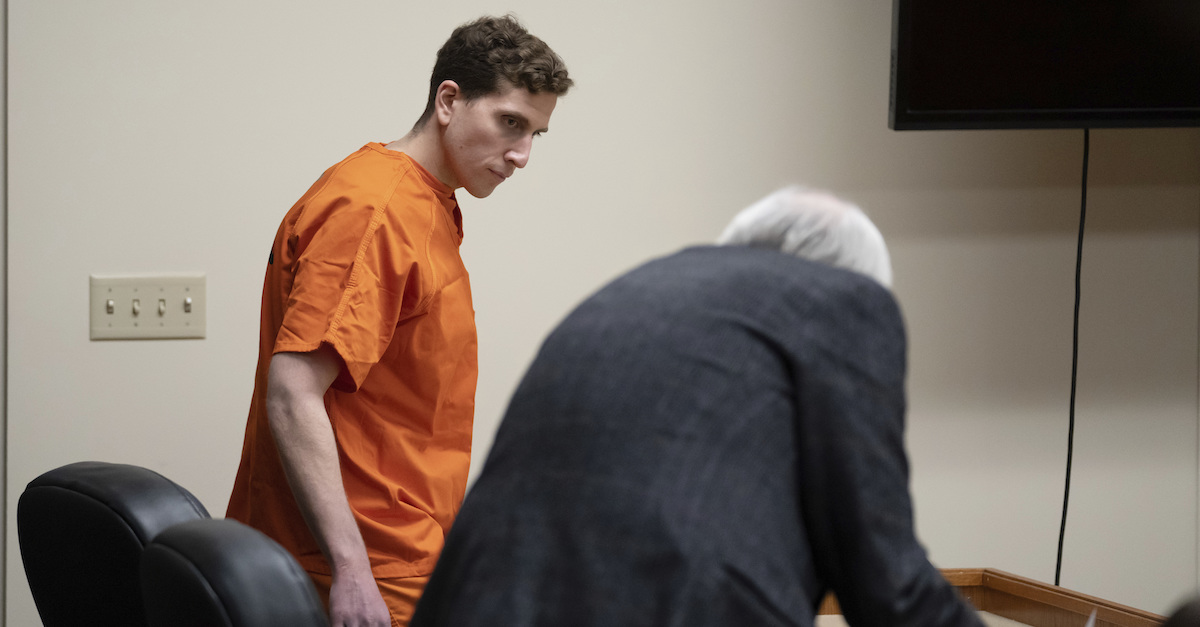
Bryan Kohberger, left, who is accused of killing four University of Idaho students in November 2022, looks toward Latah County Prosecutor Bill Thompson, right, as he takes his seat during a hearing in Latah County District Court, Thursday, Jan. 5, 2023, in Moscow, Idaho. (AP Photo/Ted S. Warren, Pool)
In the defense bar, attorneys have a phrase to describe information that isn’t helpful to their clients: They’re “bad facts,” and a federal public defender who’s represented thousands of clients says they are all over the recently unsealed affidavit in the case of Idaho quadruple-murder suspect Bryan Kohberger.
“Some are bad facts that could get better, and some are ‘bad facts’ that couldn’t get worse,” Law&Crime Network host and federal public defender Brian Buckmire said in an interview.
Authorities believe that Kohberger was the man who killed four University of Idaho students: Ethan Chapin, 20; Xana Kernodle, 20; Kaylee Goncalves, 21; and Madison Mogen, 21. The students were stabbed to death on the second and third floors of an off-campus house in the small and rural college town on Nov. 13, 2022.
The unsealed affidavit revealed that Moscow Police Department Corporal Brett Payne found a “tan leather knife sheath laying on the bed next to Mogen’s right side,” stamped with U.S. Marine Corps “Ka-Bar” and related insignia. From there, authorities found a “single source of male DNA,” and they recovered DNA from Kohberger’s father from the family residence in Pennsylvania.
“At least 99.9998% of the male population would be expected to be excluded from the possibility of being the suspect’s biological father,” the affidavit said.
The defendant’s father was not excluded. Authorities, however, do not have the suspect’s DNA yet.
“Now, where it could go depends on when ultimately they get Bryan Kohberger’s DNA,” Buckmire noted.
Another “bad fact” flagged by experts came in the form of AT&T phone records scrutinized by law enforcement. Between 2:47 a.m. and 4:48 a.m. on the night of the slayings, authorities say, Kohberger turned off his cell phone “to conceal his location during the quadruple homicide that occurred at the King Road Residence.”
Before his arrest, Kohberger had been pursuing his Ph.D. in criminology at Washington State University, about 10 miles away from the Idaho crime scene. Buckmire noted that the rural area where the stabbings took place wasn’t exactly brimming with cell phone towers.
“If we have two cell phone towers that are tracking from nine to 10 miles apart […] him being pinged on two different cell towers doesn’t mean anything,” he added.
That’s why former federal prosecutor Mitchell Epner said flatly that the government would hope to have much more evidence than is apparent in that affidavit before any trial.
“My initial reaction is I’ve seen people convicted on less evidence,” said Epner, a partner at the firm Rottenberg Lipman Rich PC. “But I would not want to go to trial if that was my only evidence.”
If a jury is predisposed to believe Kohberger’s the killer, Epner said, the DNA and the location data would be sufficient if admitted.
“I mean, the Son of Sam was basically caught because of a parking ticket,” Epner said, referring to serial killer David Berkowitz, who wreaked havoc over New York City in the summer of 1977. “No jury would be overturned for convicting on that basis.”
Beyond that, Epner noted, some of the additional evidence is murky. The affidavit refers to a footprint from a “Vans type shoe sole,” without explicitly saying it’s Kohberger’s. Some of the evidence suggests Kohberger may have “stalked” the victims, but Epner says that could have a ready-made defense — though perhaps one that’s not flattering to the accused.
“You could also think this is, you know, a loser, who was socially awkward, who lived in a university town, who was obsessed with a couple of attractive young woman,” Epner said.
The reliance upon the knife’s sheath recovered from the crime scene points to the absence of what it holds: the murder weapon.
The affidavit does, however, contain plenty of evidence of the participation in the investigation by the FBI, which is mentioned eight times in the document.
Epner, who previously led intake for sex trafficking cases in the U.S. Attorney’s office District of New Jersey, said he wouldn’t be surprised if the federal government eventually took over the case, given the interstate travel that ultimate led to Kohberger’s capture in Pennsyvania.
For Buckmire, whatever evidence Idaho authorities either may have or disclosed is outweighed by the weight of the facts proffered in the document.
“As many times I can try to poke holes in his affidavit, it’s still probably one of the strongest state affidavits that I’ve seen in a very, very long time,” Buckmire added.
If accepted by the jury, the evidence tying Kohberger to crimes alleged would reflect mistakes he would be singularly trained to recognize as a criminology student. But Buckmire noted that goes to the nature of the criminal mind.
“It’s not the intelligence of someone who commits a crime; it’s the arrogance,” Buckmire said, alluding to the suspect allegedly bringing his cell phone to the scene and returning to site 12 times.
“I know that it may be new for some people to see the idea of intelligent criminals — intelligent criminals happen all the time,” Buckmire noted. “But it’s the arrogance of a criminal that really trips them up.”